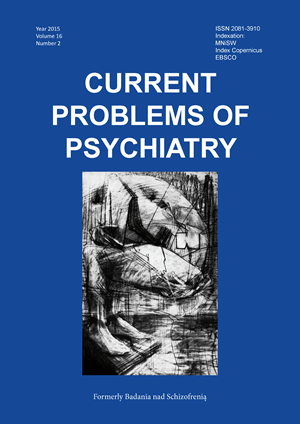Co przeżywają rodzice dzieci hospitalizowanych w Oddziale IntensywnejTerapii Noworodka: strategie radzenia sobie ze stresem, poziomodczuwanego stresu i nasilenie objawów zespołu stresu pourazowego
Słowa kluczowe:
stres, noworodek, wcześniak, intensywna terapia noworodka, stres rodzicielskiAbstrakt
Wprowadzenie: Hospitalizacja dziecka w Oddziale Intensywnej Terapii Noworodka (OITN), podyktowana zagrożeniem zdrowia lub życia dziecka, wiąże się z wysokim poziomem stresu u jego rodziców.
Cel pracy: Celem niniejszej pracy była ocena strategii radzenia sobie ze stresem oraz ich wpływu na nasilenie stresu i objawów zespołu stresu pourazowego u rodziców dzieci, które w przeszłości były hospitalizowane w Oddziale Intensywnej Terapii Noworodka.
Materiał i metoda: 67 rodziców (40 kobiet i 27 mężczyzn) 42 niemowląt w wieku od 1 do 16 miesięcy, które w okresie noworodkowym były hospitalizowane w OITN, zostało poddanych badaniu przy pomocy Skali Odczuwanego Stresu (PSS-10), Wielowymiarowego Inwentarza do Pomiaru Radzenia Sobie ze Stresem (COPE), Skali Wpływu Zdarzeń (IES-R) oraz kwestionariusza własnego.
Wyniki: Średni czas hospitalizacji dziecka w OITN wyniósł 23 ± 26 dni. Objawy PTSD stwierdzono u 43,3% badanych rodziców. Strategiami radzenia sobie ze stresem, najczęściej stosowanymi przez rodziców z badanej grupy były Planowanie, Akceptacja i Aktywne Radzenie Sobie. Matki istotnie częściej niż ojcowie stosowali strategie takie jak: Akceptacja, Koncentracja na Emocjach i ich Wyładowanie oraz Poszukiwanie Wsparcia Instrumentalnego. Rodzice z objawami PTSD częściej stosowali strategie Aktywnego Radzenia Sobie, Powstrzymywania się od Działania, Zaprzeczania i Odwracania Uwagi. Z nasileniem odczuwanego stresu dodatnio korelowało stosowanie strategii Koncentracja na Emocjach i ich Wyładowanie oraz Zaprzestanie Działań, a ujemnie – strategii Pozytywne Przewartościowanie i Rozwój. Nasilenie PTSD dodatnio korelowało ze stosowaniem strategii Unikanie Konkurencyjnych Działań, Planowanie, Powstrzymanie się od Działania, Akceptacja, Zaprzeczanie i Odwracanie Uwagi, Aktywne Radzenie Sobie oraz Koncentracja na Emocjach i ich Wyładowanie.
Wnioski: Częstym problemem u rodziców dzieci leczonych w OITN w okresie noworodkowym jest PTSD. Niektóre strategie radzenia sobie ze stresem w sposób istotny statystycznie korelują z nasileniem odczuwanego stresu i objawów PTSD. W związku z tym uzasadnione wydaje się wprowadzenie wczesnej konsultacji psychologicznej oraz wdrożenie psychoterapii podstawowej przez personel medyczny w trakcie hospitalizacji dziecka.
Bibliografia
1. Łuczak-Wawrzyniak J. Matka wcześniaka – sytuacja psychologiczna i społeczna w trakcie pobytu dziecka w szpitalu i po opuszczeniu oddziału noworodkowego. Gin Prakt 2009; 1: 7-8.
2. Borimnejad L, Mehrnoosh N, Fatemi NS, Haghan H. Impacts of creating opportunities for parent empowerment on maternal stress: A quasi-experimental study. Iran J Nurs Midwifery Res.2013; 18(3): 218-221.
3. Carvalho AE, Linhares MB, Padovani FH, Martinez FE. Anxiety and depression in mothers of preterm infants and psychological intervention during hospitalization in neonatal ICU. Span J Psychol. 2009; 12: 61-70.
4. Griffin T. Supporting families of infants with congenital heart disease. Newborn Infant Nurs Rev. 2002; 2: 83-89.
5. Lau R, Morse CA. Parents' coping in the neonatal intensive care unit: a theoretical framework. J PsychosomObstetGynecol. 2001; 22:41-47.
6. Lasiuk GC, Comeau T, Newburn-Cook C. Unexpected: an interpretive description of parental traumas' associated with pre-term birth. BMC Pregnancy Childbirth. 2013; 13 (Suppl 1):S13.
7. Ward-Begnoche W. Posttraumatic Stress Symptoms in the Pediatric Intensive Care Unit. JSPN. 2007; 12(2): 84-92.
8. Juczyński Z, Ogińska-Bulik N. Wielowymiarowy Inwentarz do Pomiaru Radzenia Sobie ze Stresem – COPE. W: Narzędzia Pomiaru Stresu i Radzenia Sobie ze Stresem, Juczyński Z, Ogińska-Bulik N. (red.). Warszawa 2009, 23-42.
9. Juczyński Z, Ogińska-Bulik N. Skala Odczuwanego Stresu (PSS-10) W: Narzędzia Pomiaru Stresu i Radzenia Sobie ze Stresem, Juczyński Z, Ogińska-Bulik N. red. Warszawa: Pracownia Testów Psychologicznych; 2009, 11-22.
10. Juczyński Z, Ogińska-Bulik N. Pomiar zaburzeń po stresie traumatycznym – polska wersja Zrewidowanej Skali Wpływu Zda-rzeń. Psychiatria. 2009, 1(6): 15-25.
11. Salgado CL, Lamy ZC, Nina RVdAH, Melo LA, Lamy Filho F, Nina VJdS. Pediatric cardiac surgery under the parents view: Aqualitative study. Rev Bras Cir Cardiovasc. 2011; 26.1: 36-42
12. Kaflik-Pieróg M, Ogińska-Bulik N. Wyznaczniki stanu zdrowia personelu ratownictwa medycznego. Acta Universitatis Lodziensis. Folia Psychologica. 2004; 8: 79-89.
13. Orzechowska A, Zajączkowska M, Talarowska M, Gałecki P. Depression and ways of coping with stress: A preliminary study. Med SciMonit 2013; 19: 1050-1056.
14. Affleck G, Tennen H. The effect of newborn intensive care on par-ents’ psychological well-being. ChildHealthCare. 1991; 20: 6-14.
15. Hughes M, McCollum J, Sheftel D, Sanchez G. How parents cope with the experience of neonatal intensive care. Child Health Care. 1994; 23(1): 1-14.
16. Aftyka A, Rozalska-Walaszek I, Celej-Szuster J, Rzońca P, Kopeć A. Rozwój potraumatyczny u rodziców dzieci hospitalizowanych w oddziale intensywnej terapii noworodka - doniesienie wstępne. Hygeia Public Health. 2014, 49(3): 602-608.
17. Willert MV, Thulstrup AM, Hertz JH, Bonde JP. Changes in stress and coping from a randomized controlled trial of a threemonth stress management intervention. Scand J Work Environ Health 2009; 35(2): 145-152.
18. Jotzo M, Poets CF. Helping Parents Cope with the Trauma of Premature Birth: An Evaluation of a Trauma-Preventive Psychological Intervention. Pediatrics. 2005; 115: 915-919.
19. Bianchinia V, Ronconea R, Tomassinia A [et al.]. Cognitive Behavioral Therapy for Young People after L’Aquila Earthquake. ClinPractEpidemiolMent Health.2013; 9: 238-242.


